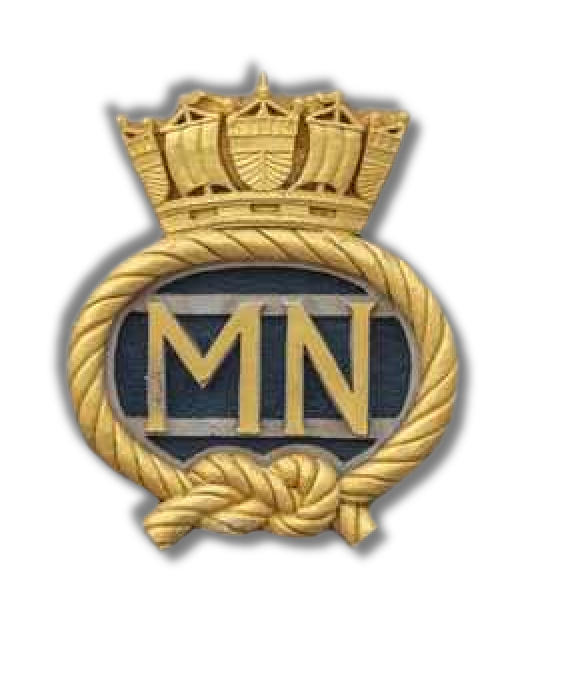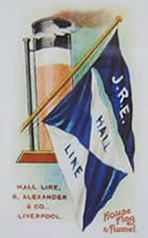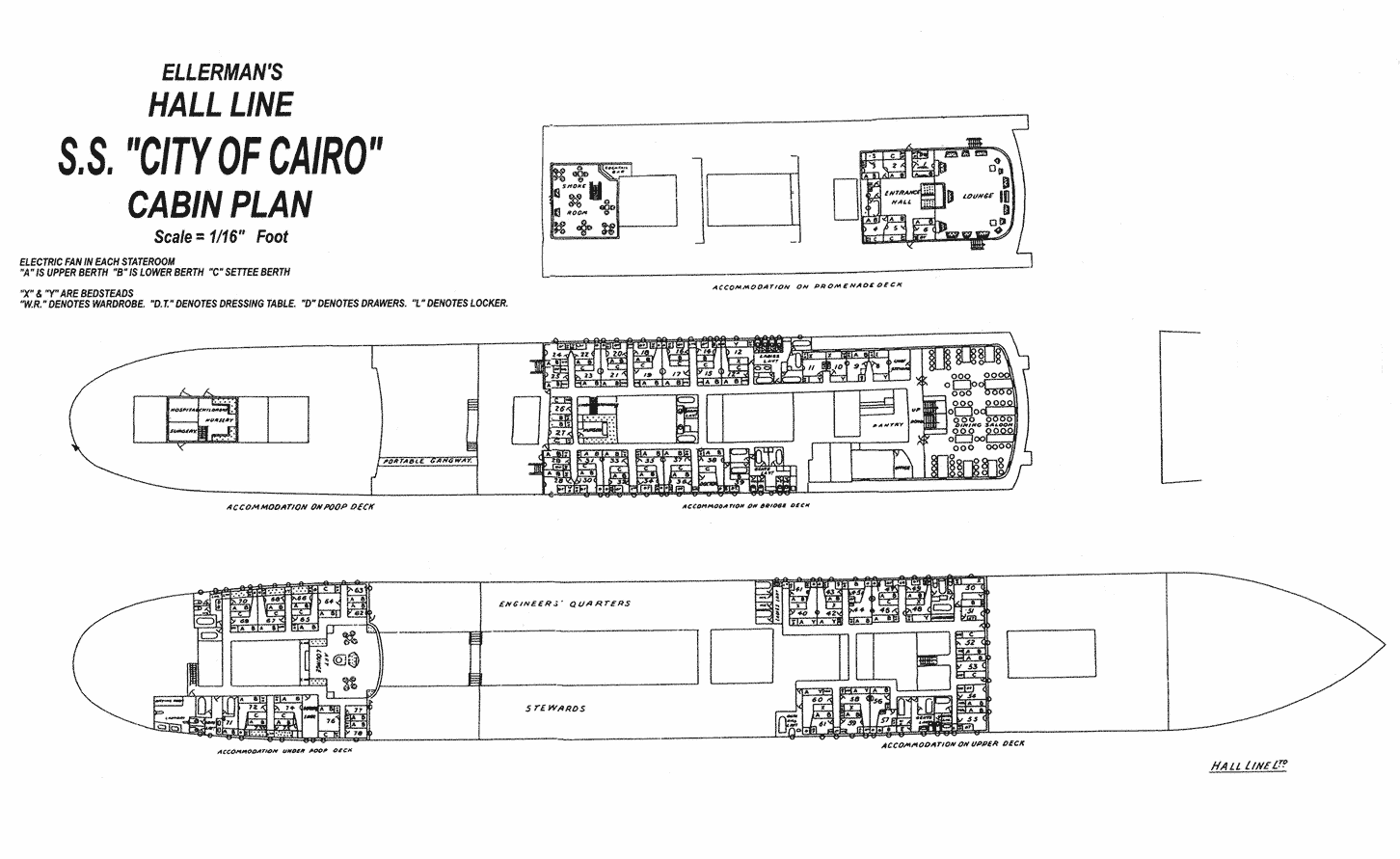Dulcie Kup 1917 – 2021
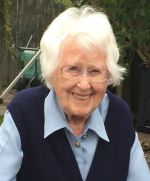
Dulcie passed away peacefully on 7th February 2021 just short of her 104th birthday which would have been on 13th March. Very much missed by all of her family and friends. Although latterly of failing memory, Dulcie, when shown a photo of the ship, always recognised it:
What a wonderful lady!
This is a copy of an account by Dulcie Kendall who was travelling as a passenger on the ship along with her three-year-old son Colin. It is reproduced here courtesy and copyright © .
OUR JOURNEY HOME 1942-43
(Dulcie & Colin Kendall)
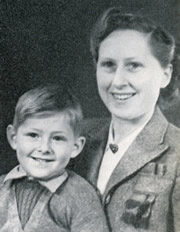
After some days in Calcutta, sorting out all that had to be done following the death of my husband, I returned to Mussoorie and Colin. Within a few weeks we left for Bombay and went immediately to stay with friends whilst I put our names down for a passage to the U.K. It had been impossible to travel by flying boat since early in the war. I was told it would be some weeks before a passage would become available so I decided to rent a small flat. Eventually, towards the end of September, we were offered a cabin on Ellerman Lines, "City of Cairo", 8,034 tons, and after some thought I accepted. We sailed from Bombay on October 1st, 1942. We were not told of the exact date and time of departure until a few hours before we sailed. There were 150 crew and 150 passengers, a third of whom were women and children. Most of the cargo of cotton and manganese ore had been loaded but at the last moment heavily guarded army trucks drew up at the quay side and some 2,000 boxes of silver rupees were lowered into the hold so I learnt many years later.
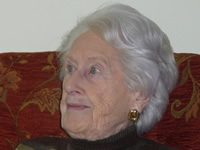
Dulcie Kup - 2014
We took about three weeks to reach Durban and were alone all the way. After coaling there for four days we went on to Capetown, where we stayed for three days. While we were in Capetown there was much gossip amongst the passengers as to where we were to go next and whether we were to go in convoy. Actually we left alone on November 1st. and still no one knew which course we were taking. It was at Capetown that we decided we had better get our 'Panic Bags' fitted out properly with all the things we thought we should need in case of emergency - I did mine very half-heartedly, never really thinking that I should need the things inside - I used to leave warm clothing at the foot of Colin's bunk for us both, at night. Throughout the voyage we had always had boat drill twice a week, and Colin was quite used to his life belt. On November 5th. the children were all playing a game with their life-belts, Colin came and told me that his had broken. I took it at once to the Quartermaster and he mended it for me and returned it the same evening. Since, I have often felt thankful that I attended to this at once as it was the next evening that we were to really need our lifebelts for the first time.
On Friday November 6th. I left Colin as usual in the cabin in his bunk looking rather sleepy and I went along to dinner. We were on the same deck as the dining-room, but at opposite ends of the ship. By this time it was quite dark and we were completely blacked out. Just about 8.30 pm. when most of the passengers had left the dining-room and Freda Bullen and I were just about to get up and go, we felt a terrific thud and were nearly thrown off our chairs, all the lights immediately went out and I heard someone say "We've got it this time". Of course we couldn't see a thing, but I managed to grab my lifebelt from the back of my chair. I then dashed down the corridor as fast as I could go to get Colin from the cabin. People were rushing about everywhere and I had a job to push my way along. There was no panic and there seemed little noise. I missed my way in the dark and had to turn back and feel my way along the wall, eventually I got to the cabin. There I found one of the men from the cabin next to ours with a torch. I found Colin sitting up in his bunk rubbing his eyes - he was quite quiet - the cabin was in an awful mess not surprising for I heard after that the Torpedo had hit us just under our cabin. I found my torch and then set about gathering together things I thought I should need. I hadn't been long in the cabin when a friend came along - we had arranged before that he would come and carry Colin for me if anything happened. I gave Colin to him, grabbed a few more things, my panic bag and a rug and went up to the boats. One flight of steps leading up to the next deck and the boats had been completely blown away but we found the others intact. By the time we got up there my lifeboat was pretty full and no more men were allowed in - needless to say many Lascars jumped in - we were then lowered. We seemed a long time getting down and when we did reach the sea we had to be quick in getting ourselves away from the ship. We were not far off when the second torpedo struck. There was a terrific explosion, an enormous flame rose from the middle of the ship and spread outwards and then she completely disappeared. There was little noise, the sea was calm and we could see a little in the moonlight. Wreckage was everywhere.
The First Radio Officer should have been in charge of our boat but he was still in the Wireless Cabin when the second torpedo struck, so sadly he had no chance of getting away. It therefore left our lifeboat with a nineteen year old Quarter-master as the only officer. Fortunately however, we had a Senior Merchant Navy Officer, George Nutter, who had been posted home from the Far East and he unofficially took charge and later was confirmed as leader. It was entirely due to George Nutter's experience and firm but friendly manner that brought us through the many difficulties we were to endure during the next 13 days. He was awarded an M.B.E. in 1946.
As one of the life-boats was being lowered the second torpedo was fired and everyone in it was thrown into the sea. All remaining boats rushed to their aid and space was eventually found for them. We already had 56 in our boat - 36 Lascars, 11 men and 8 women. Colin was the only child. Of the 11 men two were Russian, one was Sinhalese and there were two elderly and not very fit British Missionaries. Our boat was designed to hold 48 people, so we were pretty cramped and really could take no more. I was very relieved to find the friend who had helped me with Colin was safely in a boat but Freda and the Twins had unfortunately been amongst those thrown into the sea. Mercifully they were picked up and eventually were together in one of the six life-boats that got away. Suddenly someone noticed the submarine surfacing very close to our boat. Six German Submariners came out of the Conning Tower to ask us many questions and give us our position - 420 miles from St. Helena. 1025 miles from Walvis Bay. We thanked them, the men went back into the Submarine which then submerged. All this time Colin was looking very sleepy, sitting on my lap. We drifted about bumping into wreckage etc. It was then I began to wonder what would happen to us and I and some others were violently sick. I took a huge swig of my brandy and soon recovered.
The night passed slowly in spite of there being much to attend to. As soon as it was light we all got together and the Captain, who was in charge of boat No. 5., decided we should make for St. Helena. We had to row all the first day in order to get into the trade winds. It was very hard on the men. The Lascars would not do much and only under pressure did they bale the water out of the boat and work the pump during the night. We had become very full of water but it was improving. At about 4 o'clock in the afternoon we got together again to discuss plans for the night. It was decided at nightfall the six boats would tie up fore and aft with the Captain's boat leading - he had the only sextant and a small engine. However, this was a difficult and lengthy operation. We had sorted out our rations everyone being given one biscuit - very hard and dry, a tiny Horlick's tablet and 2 oz of water about 7 o'clock in the morning, the same in the evening only a tiny piece of chocolate - about one inch square - instead of the Horlicks. We were also offered Pemmican to put on the biscuit but this was very salty so often refused.
For the first week we sailed alone by day and tied up together every evening. One night we ran into a terrible storm, the seas were tremendously high, but we had no rain only lightening. It was a nightmare trying to keep from bumping into the boat in front and fearing the one behind was coming into our boat. One poor man from the boat ahead of us fell overboard. We tried so hard to reach him with our oars but being tied fore and aft it was quite impossible to rescue him. He was from Burma and had worked for Rowe & Co. in Rangoon - the Departmental Store. We all had to wear our lifebelts during this storm but Colin hated his and would not keep it on. I felt that if our boat did not stand up to the very high seas we should have little chance, belts or not, so Colin and I took ours off. Thus we went on for seven days. We reckoned we must be nearing St. Helena but as we were loosing so much time tying up each night it was decided to abandon this practice so that we could all sail by night as well as by day - but we were to try and keep together. This proved impossible for us and day break found us alone with no other boat in sight. The Lascars very soon became depressed and at night would try and steal our rations. When reprimanded would bring out their dahs (daggers). By day it was very hot, but at night bitterly cold. Most of the time we had very high seas. How our little boat stuck together is a miracle.
By November 19th when we had been in the boat for 13 days we were all feeling dispirited and weak, our mouths were parched, lips cracking. Poor little Colin kept asking for more water. They did allow him a little extra sometimes but would not let me give him any of my 2 oz. They said I needed it more than he did but it was hard for me to refuse him. I had to amuse him by planning all we would do and eat when we reached land, all the toys I would buy him. He was really amazingly good and cried very little. Normally he was extremely active but with so little food he lost his energy and slept a lot. Sleep for me was not easy, sitting upright on narrow wooden seats with almost no back support. And so just as I was beginning to wonder whether it would not be best for Colin and me to slip over the side, things were looking so grim and we thought we had missed the island of St. Helena, a cargo ship loomed up on the horizon. It was about 4.30 am. on the thirteenth morning. It was pretty dark, the sun was just emerging. We couldn't believe out eyes at first. We had thought so often we had seen land or a ship in the distance but as she slowly came nearer we saw it really was true. We all shouted at the top of our voices. Then coming to our senses realised we ought to send up flares to be sure those on board had seen us. Fortunately I had saved six matches, having been asked to keep some hidden away, matches were in great demand early on for those who smoked cigarettes. We sent up the flares we had and after a few moments the S.S. Clan Alpine answered us. "We're coming".
There was even more excitement, the sail was hauled down and some of the men even opened the water barrels to have a really good drink. Slowly we got alongside, it seemed as though all the ships company were hanging over the side to help us up. They lowered a rope ladder and insisted that Colin and I should be the first to go up. It was not easy, someone came down a short way to help with Colin. I had not realised I would feel so weak and obviously the rescuers had no idea then, how long we had been in the lifeboat. However, with a great effort I reached the deck. My hands had become very swollen and badly torn during the climb up the ladder but that did not matter. We were saved. I was told Colin had been taken to the Captain's cabin and they took me up to find him. Seeing the difficulties we had with the rope ladder they later lowered the gangway. Colin and I sat in the Captain's cabin drinking enormous cups of tea with lots of sugar. Apparently it would have been unwise to eat and drink too much too soon, so it was a few hours before we had anything to eat. Officers and Stewards kept popping in to see how we were and finally the Captain came down from the bridge. He told me we should reach St. Helena about mid-day so we were not far off the Island, although I believe we were just off course - not surprising as we had no sextant only a small compass. The Captain and Officers were all so kind to us and thought of everything we might want. Colin and I went to sleep on the Captain's bunk, absolute heaven it was, so soft and comfortable. I woke at about 8.50 am. and found the Steward had brought us egg sandwiches and oranges. Later an Officer came in to tell us two more life-boats had been sighted and that they would very soon be picking them up. This was wonderful news and I wondered which two boats they were. With another 80 odd survivors on board the Clan Alpine was becoming rather crowded and some now came and joined us in the Captain's quarters.
So we reached St. Helena. Messages had been sent from the ship to the Governor of our impending arrival. The harbour at Jamestown is very small so we were taken off in small boats and rowed ashore where the Governor was waiting with the one ambulance the island had and Army lorries, to transport us to hospital. All the women and children went to the Civil Hospital. It seemed as though everyone in Jamestown had turned out to greet us, many of the local women had volunteered to help at the hospitals. Apparently the Governor's Wife, Mrs Bain-Grey, had planned some time before for such an emergency. We were certainly grateful for our warm welcome. We were all put to bed, for what we needed most was sleep. Colin was very thin but otherwise seemed pretty well. I discovered I had jaundice, my face was brown and freckly and my lips very cracked but with the treatment they gave us Colin and I soon recovered. We stayed in hospital for just one week. Mrs. Bain-Grey brought us a change of clothes, kindly given to us by the few Europeans on the Island. It was arranged that Colin and I should stay with the Agricultural Officer and his wife - The Halcrows. They had two boys, one a little older and one a little younger than Colin. It was nice for him to have companions. Mr. & Mrs. Halcrow were extremely kind to us and we were very happy there, though naturally anxious to continue our journey home. I was very relieved to see Freda Bullen and the Twins on the Island, also the friend who had helped me with Colin had been rescued by the S.S. Clan Alpine.
All arrangements were made for us to go back to Capetown just before Christmas but the ship which was to have collected us never reached St. Helena and we heard with great sorrow that it had been torpedoed with the loss of all on board. Within a few weeks all but eight Europeans of the crew resumed their journey on a French ship. When fit enough most of the Asian crewmen returned to India via Cape Town. Colin and I moved from the Halcrows to a little bungalow, which was very near Napoleon's house, that had been taken over by the shipping company for us and two other families. We were only there a month when we heard that a ship had been diverted and would be coming to take all the remaining 63 survivors to Britain. We were of course very thrilled, though I think at the back of our minds was the feeling that it wasn't going to be a very pleasant voyage knowing that we might quite possibly suffer the same experience again, though the rumour went round that we should be escorted this time.
We finally left on the 19th February 1943 on the T.S.S. Nestor and as we sailed away from St. Helena I couldn't help feeling how lucky we were to land on an island where everyone was so kind. The ship was a good deal larger than the old Cairo - about 12,000 tons and we had a small escort vessel with us. We sailed over to Freetown only to find that we had to wait outside the port for two or three weeks in order to join a convoy which was bound for Britain. It wasn't an exactly uneventful voyage, we had one bad night when we had a pack of submarines after us and some of the boats were sunk but this time luck was with us and so, exactly six weeks after we had left the island, we arrived in England.
No mention has been made so far of the fate of the three other lifeboats that got safely away from the City of Cairo on the evening of 6th November.
Boat No. 8 with fifty five people on board had a defective mast and had been unable to keep up with any of the other boats. Early on their 14th morning and when moral was very low a ship was sighted. It was the 8,500 tonne BENDORAN on her way from Scotland to Simon's Bay, Cape Town. She came alongside and picked up the forty seven Europeans and Asians who had survived and took them to Cape Town.
Tragically Boat No. 1 with twenty three Europeans and thirty one Asians sailed on for thirty six days without sighting land or ship. At the end of the third week only eight people were still alive, but when the German freighter RHAKOTIS, 6,753 tonne, found them only two British men and one woman were in the boat. Diana Jarman, a war widow 21 years old, had a very bad throat condition and the German Doctor, having obtained permission from the two British men, decided he had to operate. Sadly she died under the anesthetic. The two British men however eventually reached home safely.
Boat No. 4 had an even more grueling experience. It was a small boat holding only five British men, one Australian woman, whose husband had been unable to escape from the Cairo, and ten Asians. This boat sailed on for fifty one days by then only Margaret Gordon and James Knocker Whyte, Third Officer of the Cairo, had survived the ordeal. They were rescued by a Corvette of the Brazilian Navy when they were only eight miles from the South American coast having sailed over two thousand miles on their own since 13th November. By then it was December 27th 1942.
Dulcie Kendall
Read more about Dulcie Kup of Warnham
